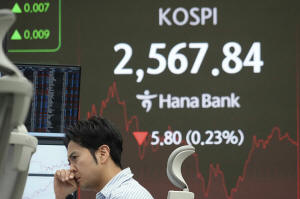World shares advance, despite Wall Street's tumble, as China pledges to
boost consumer spending
[March 14, 2025] By
ELAINE KURTENBACH
BANGKOK (AP) — Shares in Europe and Asia advanced Friday, shrugging off
another decline on Wall Street, with markets in China gaining after
state-run banks and other financial institutions were ordered to do more
to help spur more consumer spending.
Germany's DAX rose 0.4% to 22,667.45, while the CAC 40 in Paris climbed
0.7% to 7,996.78. Britain's FTSE 100 was up 0.4% at 8,577.97.
U.S. stocks looked primed for gains, with the future for the S&P 500 up
0.7% while that for the Dow Jones Industrial Average was 0.5% higher.
In Asian trading, Hong Kong’s benchmark jumped 2.1% to 23,959.98, while
the Shanghai Composite index surged 1.8% to 3,419.56.
China's National Financial Regulatory Administration issued a notice
Friday ordering financial institutions to help develop consumer finance
and encourage use of credit cards, do more to aid borrowers who run into
trouble, and be more transparent in their lending practices.
Economists say China needs consumers to spend more to get the economy
out of the doldrums, although most have advocated broader, more
fundamental reforms such as increasing wages, social welfare and support
for public health and education.
In Tokyo, the Nikkei 225 added 0.7% to 37,053.10, while South Korea's
Kospi slipped 0.3% to 2,566.36.
Australia's S&P/ASX 200 gained 0.5% to 7,789.70, while Bangkok's SET
jumped 1.2%. The Taiex in Taiwan was nearly unchanged.
On Thursday, Wall Street’s sell-off deepened as President Donald Trump’s
escalating trade war dragged the S&P 500 more than 10% below the record
it set last month.

A 10% drop is big enough that professional investors have a name for it
— a “correction” — and the S&P 500’s 1.4% slide on Thursday sent the
index to its first since 2023. The benchmark index closed at 5,521.52.
“For now, traders are bracing for another round of policy-induced
whiplash, knowing full well that in this environment, certainty is a
luxury they won’t be getting anytime soon,” Stephen Innes of SPI Asset
Management said in a commentary.
Adding to risks was a partial government shutdown that might ensue if
Congress fails to pass its annual appropriations bill.
[to top of second column] |

A currency trader watches monitors near a screen showing the Korea
Composite Stock Price Index (KOSPI) at the foreign exchange dealing
room of the KEB Hana Bank headquarters in Seoul, South Korea,
Friday, March 14, 2025. (AP Photo/Ahn Young-joon)
 The losses came after Trump upped
the stakes in his trade war by threatening 200% tariffs on Champagne
and other European wines and alcohol, unless the EU rolls back a
tariff on U.S. whiskey it imposed in response to U.S. tariffs on
European steel and aluminum. Not even a double-shot of good news on
the U.S. economy could stop the bleeding.
The Dow slumped 1.3%, while the Nasdaq composite fell 2%.
The dizzying swings for stocks result from uncertainty about how
much pain Trump will let the economy endure through tariffs and
other policies in order to reshape the country and world as he
wants. The president has said he wants manufacturing jobs back in
the United States, along with a smaller U.S. government workforce
and other fundamental changes.
Measures of confidence in the economy for U.S. households and
businesses have dropped due to uncertainty about which tariffs will
stick from Trump’s barrage of on -again, off -again announcements. A
pullback in spending that could sap vitality from the economy, and
some U.S. businesses say they’ve already begun to see a change in
their customers’ behavior.
Still, there was good news on the economic front.
One report showed inflation at the wholesale level last month was
milder than economists expected, in line with an encouraging report
a day earlier on consumer inflation.
A separate report said fewer U.S. workers applied for unemployment
benefits last week than economists expected, suggesting the the job
market is steady.
In other dealings early Friday, U.S. benchmark crude oil gained 90
cents to $67.45 per barrel, while Brent crude, the international
standard, was up 85 cents at $70.73 per barrel.
The U.S. dollar rose to 148.93 Japanese yen from 147.82 yen. The
euro slipped to $1.0851 from $1.0855.
All contents © copyright 2025 Associated Press. All rights reserved |